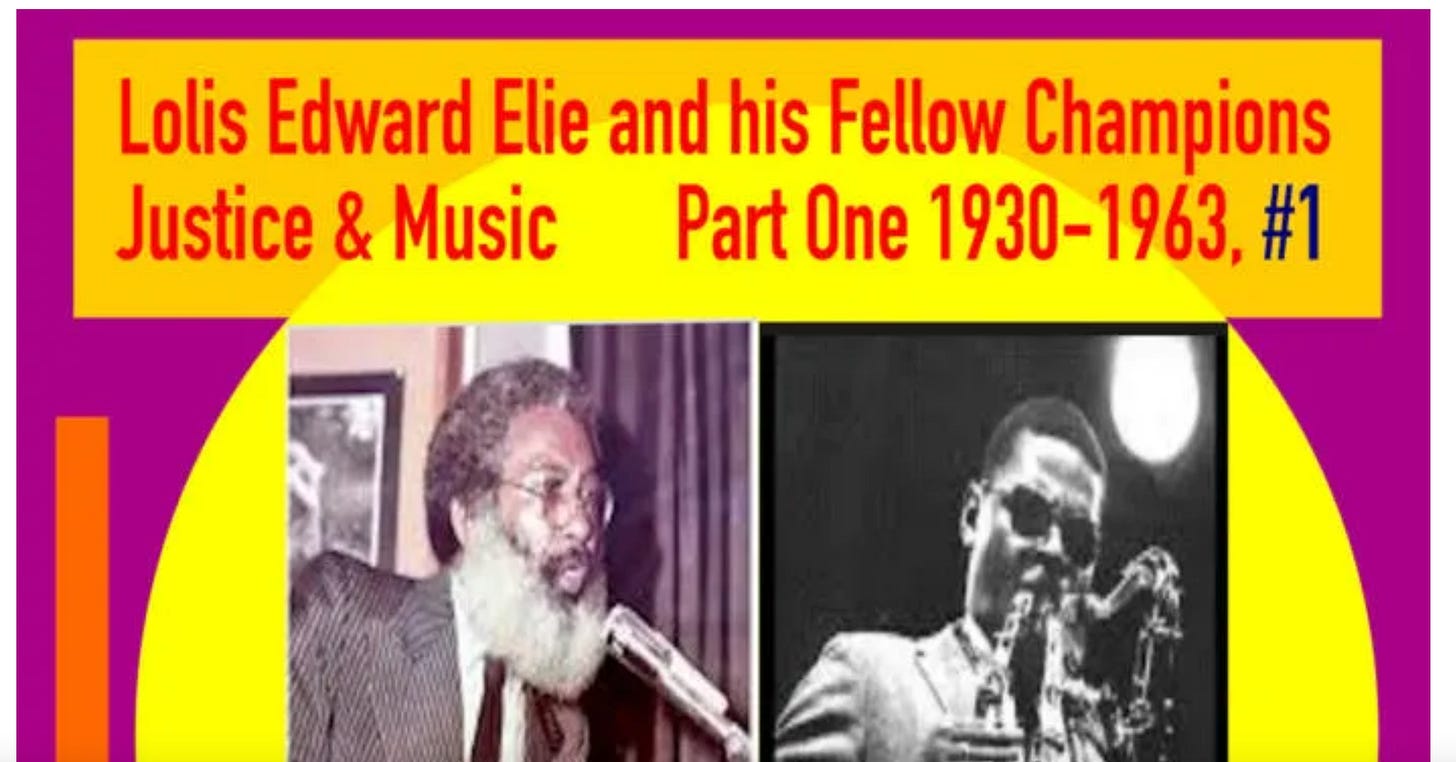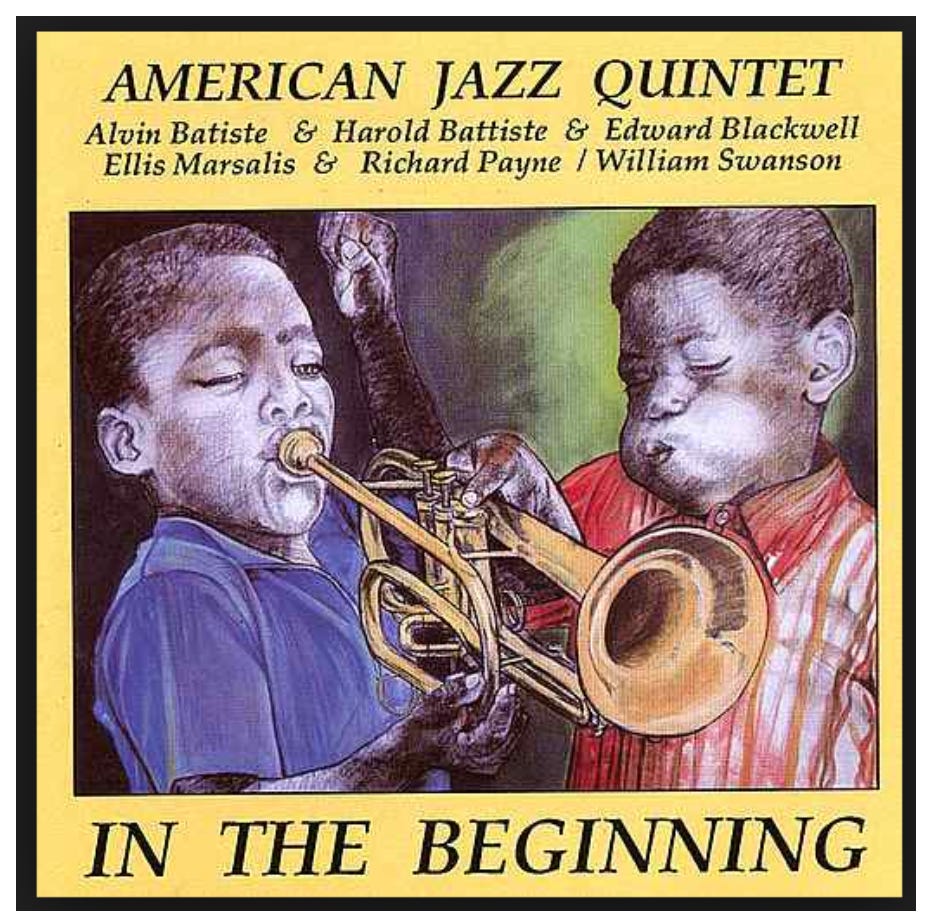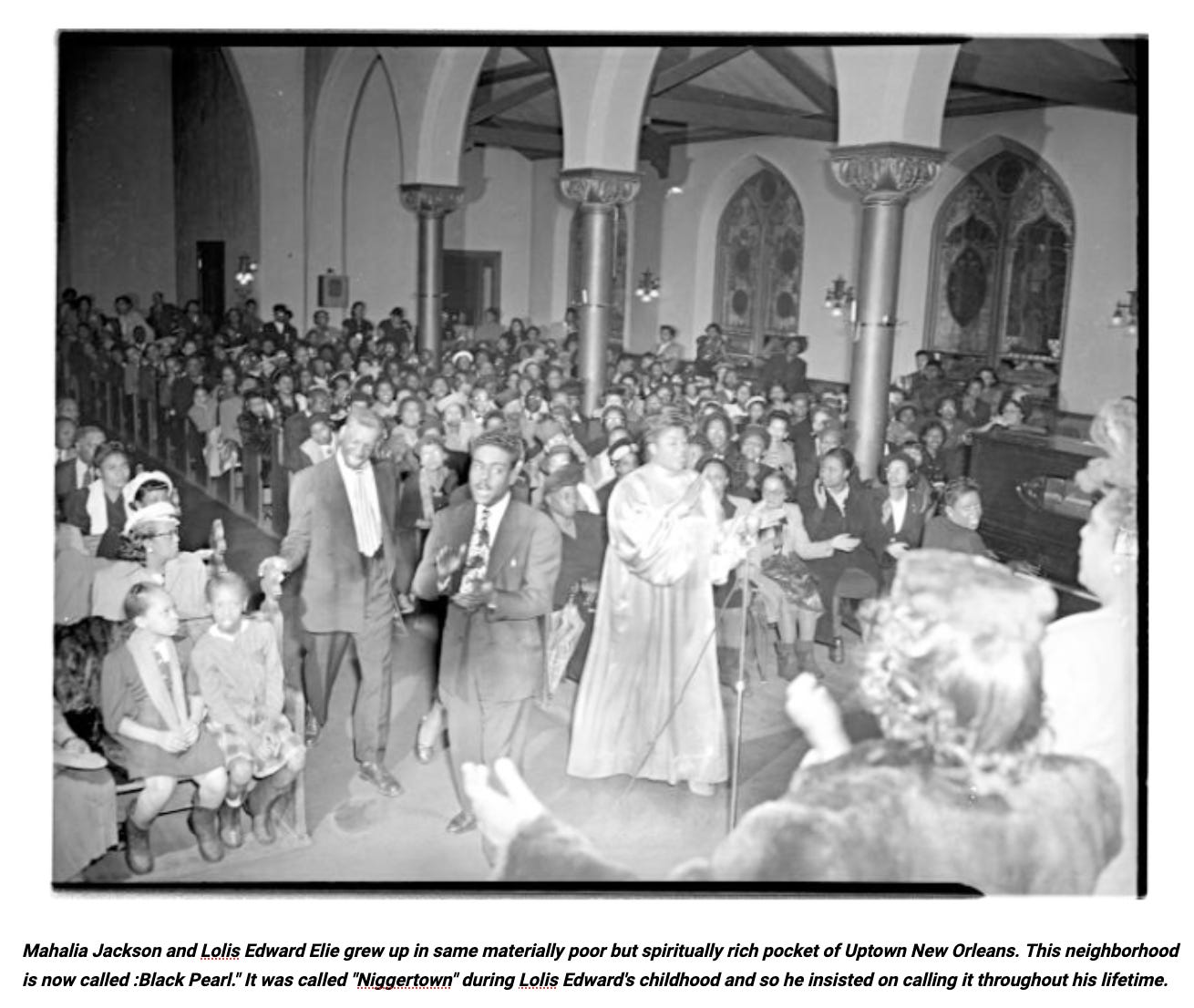Lolis Edward Elis and His Fellow Champions--1930 to 1963, episode #1
Interviews with LOLIS EDWARD and LOLIS ERIC. Music from RAHSANN ROLAND KIRK with Stanley Clarke, McCoy Tyner and Lenny White; the AMERICAN JAZZ QUINTET; LOUIS ARMSTRONG'S HOT SEVEN; and PAPA CELESTIN
I’m so GLAD to see traffic and responses to the Episode #3 from MARYSE’s and my series about ‘LOLIS EDWARD ELIE and his Fellow Champions’.
Below are essences from the opening of our series about the pioneering Civil Rights attorney and activist, Episode #1.
Again, you take in the WHOLE excerpt over on the WeAreRevolutions website—
Please, too, LISTEN on Bandcamp to the Spoken Voices and the Music
And ON to the essences of Episode #1 with LOLIS EDWARD.
‘Here's the first excerpt from a two-hour 'Spiritual: New Orleans' Music & The World' show that celebrates attorney Lolis Edward Elie and his peers among activists and musicians. 'Lolis Edward Elie and His Fellow Champions: Justice and Music" spans the first 33 years of Lolis Edward's life and career, 1930 to 1963. The title is complex because Lolis Edward's interests and involvements were complex. In the TIMELINE below he and musicians whom he admired--Rahsaan Roland Kirk, Charlie Parker, Thelonius Monk, Ella Fitzgerald, ...--are compared to rockets or beacons. Their progress over a little more three decades is likened to a miracle.
TIMELINE
0:00 JUDGE CALVIN JOHNSON “And Lolis became our lawyer … When he stepped into that Courtroom, he was seven feet tall. And I know in stature he was about five-four, or five-five, … And when he opened his mouth and started to speak he controlled that room … this is 1964, in a Courtroom in south Louisiana, manned by a White Judge.”
0:37 NARRATION WHO is this? WHO is being talked about with such admiration here—talked about in 2017 by his client of 1964 in the town of Placquemines, Louisiana, his client then age 17 and now age 70 and a Judge himself, Judge Calvin Johnson, Judge Calvin Johnson named last year the Criminal Justice Commissioner of the City of New Orleans …
Who is this man “five-four, or five-five” in stature who still stands “seven feet tall” to Judge Calvin Johnson after 53 year? Who is this whose voice controls a Courtroom in south Lousiana—before a White Judge—in 1964?
Who we’re talking about, this “Lolis” that Judge Johnson remembers, is Lolis Edward Elie.
1:32 “CAPETOWN” (4:56), the American Jazz Quintet, 1956
6:27 NARRATION That was “Capetown” by the New Orleans’ American Jazz Quintet, recorded in 1956 at Cosimo Matassa’s studio in the French Quarter, featuring Alvin Batiste on clarinet, Harold Battiste on tenor saxophone, Edward Blackwell on drums, and Ellis Marsalis on piano.
1956, and that person who grew to seem seven feet tall, Lolis Edward Elie, is a young man too, like the four New Orleans musicians who would later become his friend. He’s stepping from Dillard University, from founding the first student chapter of the National Association for the Advancement of Colored People at Dillard, to becoming an Attorney in a City Hall of Courtrooms inhabited by Whites only and of drinking-fountains that were strictly segregated.
Lolis Edward Elie was born on January 9th, 1930. He was among eight children raised in the same Uptown pocket of New Orleans that shaped Mahalia Jackson. His parents had a total of four years’ scholastic education between them, as you’ll soon hear, three of those years his mother’s schooling on an Upriver plantation, but his parents infused in Lolis Edward a pride and resourcefulness that guided him forever. Lolis Edward was given his middle name in honor of a defiant Uncle.
Let’s listen to him. Let’s hear his voice In 2006, the year following the immiseration of New Orleans due to flooding caused by Government infrastructure’s failures, Lolis Edward was interviewed by his son, Lolis Eric Elie, himself distinguished as an author, journalist, and screenwriter, for the national Story Corps project.
8:13 LOLIS ERIC ELIE and LOLIS EDWARD ELIE. How Lolis Edward arose to “become a lawyer”. His “mother’s prayers”, his parents’ hard work, his mother’s miracles of maintaining a house and feeding a family of ten.
9:57 “PEDAL UP” (4:24) Rahsaan Roland Kirk with Stanley Clarke, McCoy Tyner, and Stanley Clarke. 1975 Downbeat Awards show, hosted by Quincy Jones.
14:21: NARRATION Rahsaan Roland Kirk! Rahsann Roland Kirk, saxophonist, multi-instrumentalist, and much more, performing his “Pedal Up” live in 1975 with McCoy Tyner on piano and Stanley Clarke on bass and Lenny White on Drums-set.
Rahsann Roland Kirk was another favorite musician of Lolis Edward Elie’s. Rahsaan was another rebel and rocket and genius companion for Lolis Edward and his peers. Decades before he became an Attorney, decades after he began to fight for justice, music was Lolis Edward’s vital and guiding company. Blacks’ music’s progress was miraculous like his.
He was friends with many musicians. He knew in and of New Orleans Louis Armstrong and Sidney Bechet, Mahalia Jackson and Papa Celistin. He knew as a young man, while shining shoes in New York City, Duke Ellington and Billy Strayhorn, Charlie Parker, Dizzy Gillespie, Theolonius Monk, Mary Lou Williams, Miles Davis and Sonny Rollins. He befriended in New Orleans Harold Battiste, Danny and Blu Lu Barker, Professor Longhair, Ellis Marsalis and his sons. He welcomed Betty Carter into his Jazz Fest parties and his affections extended from Don Shirley to Amy Winehouse.
He was, as we were saying, a beacon among ‘Beacons’ like Baudelaire’s great painters, a rocket among rockets, launched improbably across American decades from 1930 unto the 21st century by his and peers’ and ancestors’ wills and their seizing chances into unimaginable accomplishments.
Lolis Edward told his son Lolis Eric that he’d come from “almost a slave community.”
16:20 LOLIS EDWARD ELIE on his childhood neighborhood.
16:41 NARRATION Let’s hear Louis Armstrong, issue of Storyville streets and New Orleans’ Colored Waif’s home, in one of the breakthroughs in the music called Jazz, “Wild Man Blues”, recorded in Chicago with his Hot Seven, May 1927. Louis Armstrong, trumpet, Johnny Dodds clarinent, Baby Dodds drum-set, Johnny St, Cyr banjo, Lil Armstrong piano, Pete Briggs, sousaphone, and John Thomas trombone.
Where did Louis Armstrong come from? What but genius … explains Louis Armstrong and peers of his such as Johnny Dodds, Joe “King Oliver”, Sidney Bechet, arising from the cross-pollinated patchwork known as New Orleans, one city of these United States?
17:39 “WILD MAN BLUES” (3:27) Louis Armstrong Hot Seven, 1927
20:48 NARRATION New Orleans in the 1930s ... founding geniuses of jazz played on South Rampart Street in venues that also were segregated as drinking-fountains were segregated. A teacher of Lolis Edward’s, Ms. Beulah E. Brooks, taught him literal ins and outs of asserting himself as a free and equal being. His parents reinforced that pride.
21:13 LOLIS EDWARD ELIE on Ms. Brooks and his parents.
[How can people of such value as Ms. BEULAH BROOKS, contributors to one of the world’s richest and most uplifting cultures, be OMITTED within the Search-Engines of Big Tech? It’s as if such contributors are MEANT to be NOT REMEMBERED.)
22:14 NARRATION Intro to Oscar “Papa” Celestin and the Original Tuxedo Jazz Orchestra and their “Give Me Some More”, 1926 on Columbia Records.
You can hear Lolis Edward and Lolis Eric and all the players in this excerpt here--
RELATED
Spiritual as Music: 22 Hours
Thanks very much for readers’ responses to the songs, “A.I. Lover (Serves Users For Lunch)” and “Homeland Security”.















